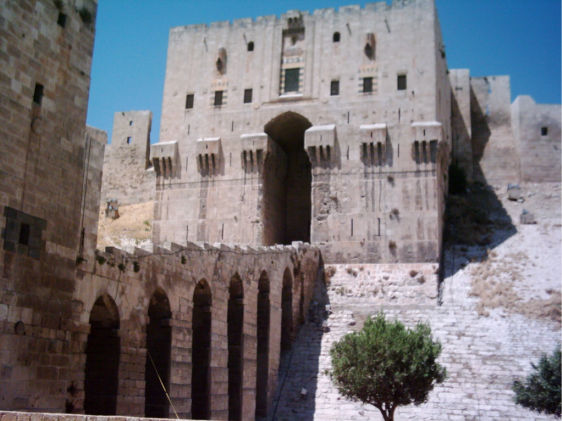| Welcome |
| Aleppo speaks |
| Issues |
| The making of soap |
| Aleppo´s history |
| Diary, Oct. 2007 |
|
|
|
Aleppo speaks
presented by a Syrian from Aleppo
Aleppo is the second-largest city in Syria. She isn´t far from the Southern border of Turkey. For about 4000 years, she was a significant trading station between East and West, where merchants exported their goods from India, Persia, Pakistan and China, through Baghdad and Aleppo to the West, or where they imported from the West. She is a beauty, and she has a distinct charme of her own.
She is also a traditional industry and trading town. The production of soap started maybe one thousand years ago.

Typical Aleppo
Soap production, like Aleppo, is about tradition. The soap is made of ingredients like olive oil and laurel oil. There are big amounts of them.
It is people from Aleppo who make it. It is family business, and passed on from Grandfather to father, from father to grandson. Sometimes, one business has been in the hands of one family for one- or even two-hundred years.
Abu Mustafa´s working day
Abu Mustafa is 73 years old. He makes and sells soap. He was fifteen years old when he started with this work. The old workshop, technology, and material has never changed, he says. From many hundreds of years ago up to now, the soap has been the same. Only the people don´t remain the same.
One father passes away, his brother or his son carry on. Abu Mustafa tells his story.
Every morning, the call to prayer wakes me up. I wake my wife, get ready and go to the mosque. On my way, I meet the other old people, who, like me, go to prayer. We pray as a new day is dawning.
Then, each of us goes to his shop. Built in the era of the Osmanian Empire, the market is now very old, traditional, and narrow. I open my shop and prepare it for my customers. My place is in front of the shop. The book that I read is "Al Kurana" or Alcoran, the Koran.
I start my working day with hope and prayer.
My customers come from all kinds of regions to buy my soap. Everyone gets his bread from Allah. No worries, my colleagues and I here say. At 2 p.m., it is lunch time. My wife has prepared lunch at home, and the boy who is working for me gets our lunch from there. Thank God, we have food, health, and salvation.
In the afternoon, around 4 p.m., our shops start selling once again.
I haven´t got a phone yet. I don´t think that people, who want to buy my soap, need phone calls from me. Advertising is nonsense. My soap itself does the advertising. With the call to prayer as the sun sets, I close my shop, thank Allah for his mercy, and get on my way to the Umaja mosque. After prayer, I go home. The working days are long.
End of the Day
Abu Mustafa has dinner with his big family, fourteen people all at one table. All have done their share of work, and all are hungry. After the meal, the evening session begins, with Arab tea, and sweets. There is a lot of loud laughter, fun, and attention for each other.
Everyone goes to sleep at 11 p.m., to get started again tomorrow. Night by night, Aleppo´s people sleep, but the big historic citadel stays awake and shines on all the roofs of the city.
To me, Aleppo is the Orient, and the Orient is only Aleppo. MHSimilar contents in German
|
|
|